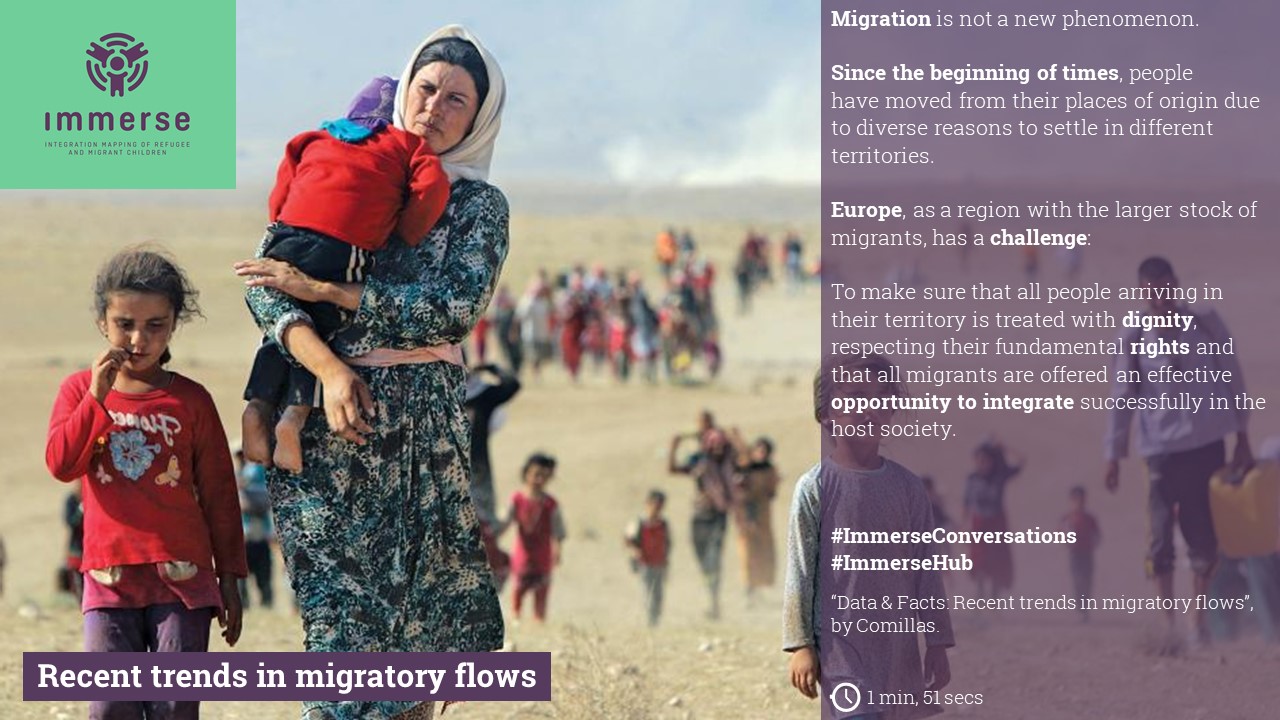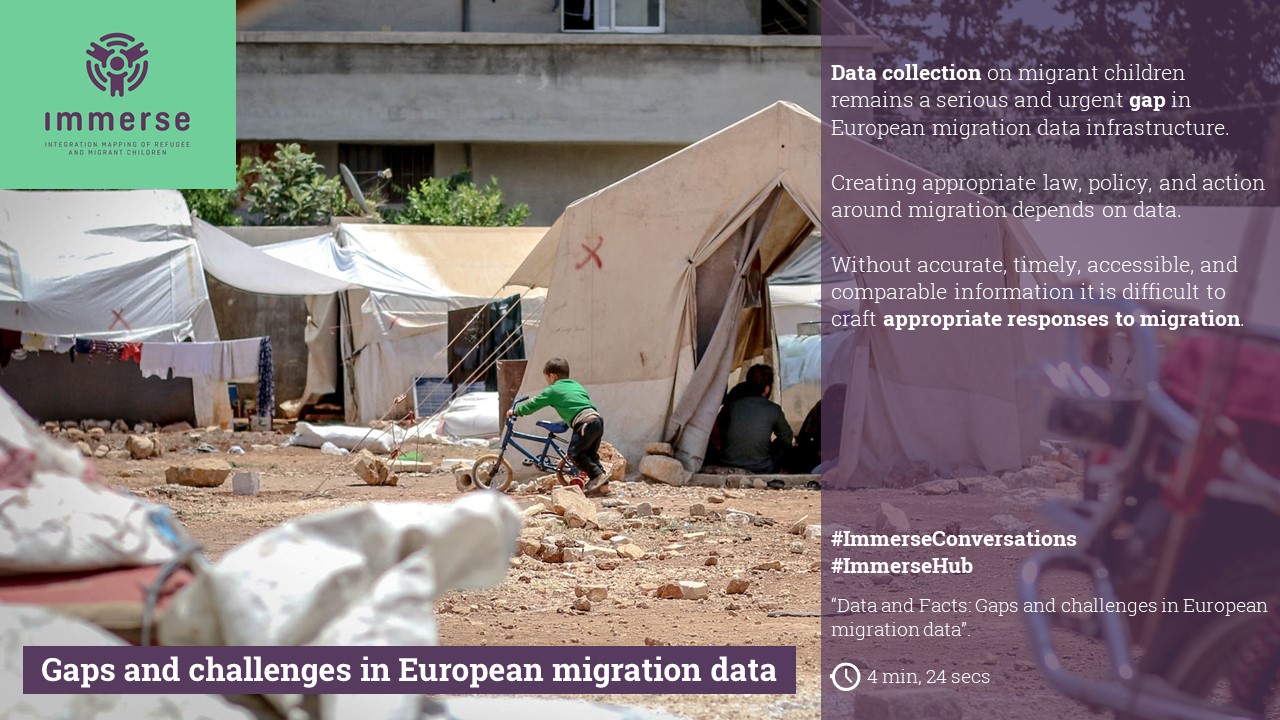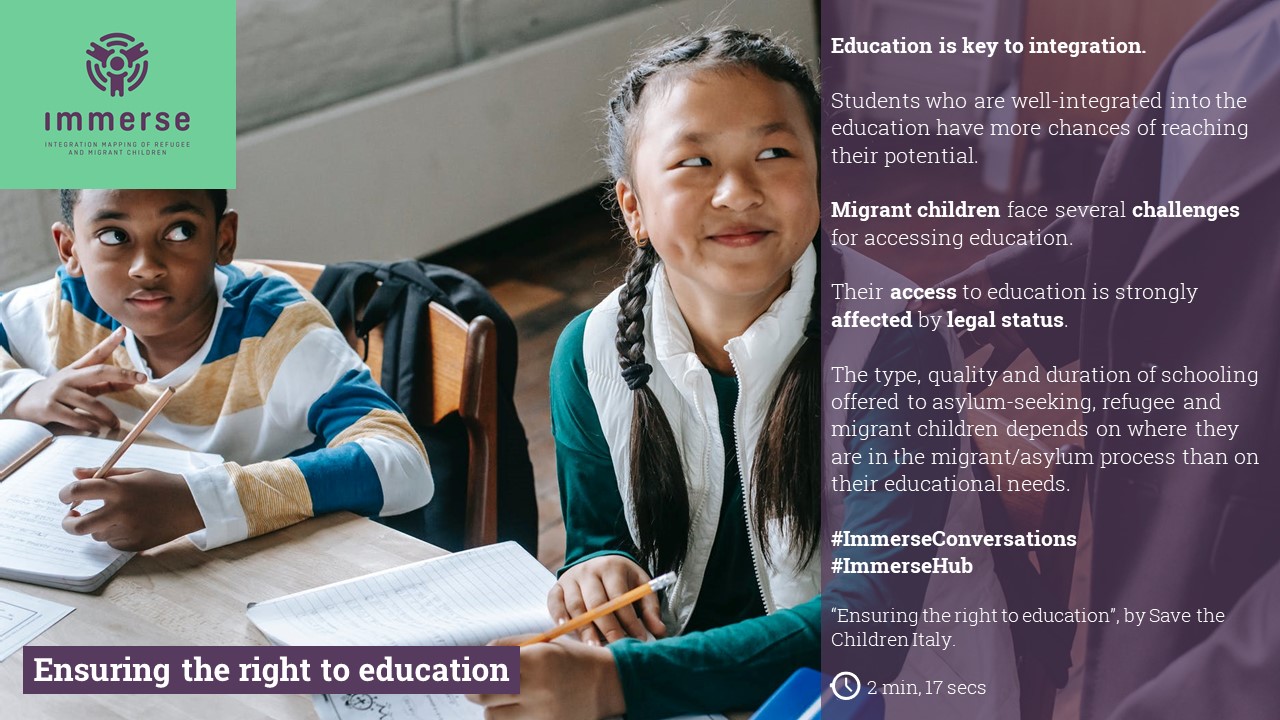|
|
|
|
|
|
|
The IMMERSE hub
A forum for discussion on the integration of
refugee and migrant children in Europe
|
|
|
|
|
|
Your contribution is essential! Comment on the hub's topics and discussions:
|
|
|
|
|
|
What is the IMMERSE hub?
How to join, use and enjoy the platform
|
|
|
The IMMERSE hub is an online platform created within the project website. The platform has been designed with the aim of creating a discussion forum around the topic of socio-educational integration of refugee and migrant children in Europe.
|
The target audiences of the platform are academic researchers, policy makers, NGOs and organisations involved in working with migrants and refugees, social workers in direct contact with children in migrant backgrounds, schools, and anyone involved in any way with the integration of this sector of the population in Europe and beyond.
|
In order to access the short articles on the hub, comment on the discussion topics and post your own entries, you must be registered. Registration is easy, all you need is an email address and a password. The aim is to grow the network around the H2020 IMMERSE project in order to discuss and contrast points of view and experiences drawing the best conclusions and advice regarding the integration of refugee and migrant children.
|
|
The open topics for discussion at the moment are related to data and facts, rights and education and social inclusion. Some of them are presented below.
|
Join the hub, your contributions are valuable and the debate is necessary to contrast views and find best practices for implementation in Europe. We have a common goal: the integration of all children into the societies in which we live, with equal rights and offering them all equal opportunities for their present and their future.
|
|
|
|
|
|
|
|
Data & Facts: Recent trends in migratory flows
|
|
|
Migration is a phenomenon as ancient as human kind. Since the beginning of times, people have moved from their places of origin due to diverse reasons to settle in different territories and with different people. In the present time, countries use data about the number of migrants entering or leaving into their territory during a given time (usually a year) to understand how international migration varies. This calculations constitute the migration flows of a given country.
|
|
This apparently simple statistic is not always available or easy to obtain. Not all countries report data about the migrant flows, and those who do it usually get this information from a variety of sources that often prevents to have comparable data among countries, such as administrative sources or specific survey data. Despite of this problem... Read more here.
|
|

|
|
|
|
|
Language as a barrier to integration in education
|
|
|
|
Language acquisition is perhaps one of the most fundamental skills needed for migrant integration in host countries. Among the many features that can prevent integration, an inability to understand and speak the host country language presents a clear barrier to socio-economic inclusion. The problem can begin at early stages for newly arrived migrant and refugee children, where the incapacity to communicate in the language of instruction at an academic level is related to lower educational outcomes. This is often exacerbated by the fact that one or both parents may also lack host-country language fluency, thus removing their ability both to help their child, either directly with homework, or indirectly by engaging with the child’s teachers and school. This academic under performance can extend into second generations, potentially widening the socioeconomic gap between migrants and their adopted countries. Read more here.
|
|
|
|
|
|
|
|
Information and Misinformation:
Gaps and Challenges in European Migration Data
|
|
|
|
Creating appropriate law, policy, and action around migration depends on data. Without information that is accurate, timely, accessible, and comparable, it is difficult to craft responses to migration that are appropriate and just, particularly in the context of a region as large and diverse as Europe. The size and diversity of Europe, however, makes the provision of such information a monumental undertaking that requires a great deal of infrastructure and cooperation. In this short post, I will give a brief overview of the EU migration data landscape and the gaps and challenges faced therein, drawing on reports published by the Joint Research Centre of the European Commission (Amran and Urso, 2016; Santamaria and Vespe, 2018) and other research funded under the EU’s Horizon 2020 project (Bircan et al, 2020). Read more here.
|
|
|
|

|
|
|
Ensuring the right to education
|
|
|
One of the most crucial requirements to ensure a successful and long-lasting integration in a host community is certainly ensuring the right to education.
|
As highlighted in the Eurydice 2019 report, students who are well-integrated into the education system both academically and socially have more chances of reaching their potential.
|
|
Access to quality education for all is high on the agenda in Europe and in the wider international community. It consists of two aspects: access to education as a universal human right regardless of legal status (Universal Declaration of Human Rights, 1948); and access to quality education – enrolling in a school that provides high quality teaching and learning, and being able to take educational pathways that lead to high level skills (European Commission, 2013). Students from migrant backgrounds, however, face several challenges that can affect... Read more here.
|
|

|
|
|
|
|
IMMERSE consortium is formed by eleven partners from six countries:
|
- Comillas Pontifical University (Spain)
- Zabala Innovation Consulting (Spain)
- INFODEF Institute for the Promotion of Development and Training (Spain)
- Ministry of Inclusion, Social Security and Migrations (Spain)
- Informática el Corte Inglés (Spain)
- Save the Children Italy (Italy)
- DOZ e.V. International (Germany)
- Active Citizen Europe (Belgium)
- Panteion University of Social and Political Studies (Greece)
- Regional Directorate of Primary and Secondary Education of Crete (Greece)
|
|
|
    
|
|
|
|
|
This project has received funding from the European Union’s Horizon 2020 research and innovation programme under grant agreement 745625. The dissemination of results herein reflects only the author’s view and the European Commission is not responsible for any use that may be made of the information it contains.
|
|
|
|
|
|
|
|
|
|